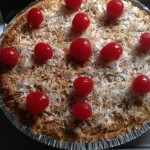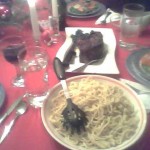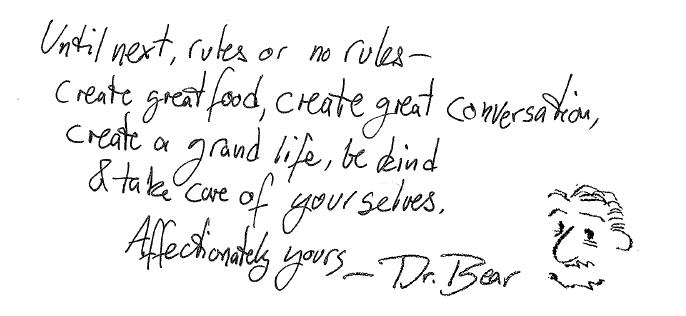It recently occurred to me how odd my recipe collection here in my posts is.
From reading here, one would get the impression that I cook mostly muffins; that is not the case. The recipes that I post are for things that I actually bother to follow a recipe  for; most of the things I cook–the stews, pastas, potatoes & rice dishes that make up my day-to-day life aren’t necessarily planned, and certainly aren’t measured–and this is what most cooking, as well as most of my life, is like: I look at what’s available, and I make the best of it. I recently had a wonderful pineapple-coconut-upside-down-pie that long time reader and Bistro regular Rachel had made, but she couldn’t have told me the recipe–she just put in what she thought would be good (and it was).
for; most of the things I cook–the stews, pastas, potatoes & rice dishes that make up my day-to-day life aren’t necessarily planned, and certainly aren’t measured–and this is what most cooking, as well as most of my life, is like: I look at what’s available, and I make the best of it. I recently had a wonderful pineapple-coconut-upside-down-pie that long time reader and Bistro regular Rachel had made, but she couldn’t have told me the recipe–she just put in what she thought would be good (and it was).
There are people whom this drives crazy–they need to be able to measure everything, and they need to know exactly what to do and when to do it. They need hard, fast formulas that they can follow to the letter to be absolutely certain that it comes out right. Lots of recipes are a good thing when you are still just trying to find your way around a kitchen, but eventually, they just become “guidelines.” Apples, potatoes & carrots don’t come in uniform sizes, flour doesn’t come in uniform levels of moisture, even the difference in air pressure on different days can change food–you are working with food, not forcing it to do something.
Now, there are things that matter:
Proportion matters; in oatmeal or rice or other cooked grains, the amount of liquid will be twice that of the grain. The perfect biscuit has a perfect proportion of flour, leavening, shortening, and moisture. It is obviously possible to have too much salt.
For some dishes, recipes matter more; bread involves a great deal of time letting the dough rise and then bake, as do cakes, and there is really no way to alter the recipe in the middle of baking the way I constantly do with soups, stews, etc. Cooking for large groups, it is also necessary to have some recipe in mind, just because of the difficulties of scale.
But even with things that have no recipe, it is possible to say that you got it right  (Rachel’s pie, the Seitan Sauerbraten I made up), or that you got it wrong (the first attempt at the spun sugar nests). The balance, the flavors, how well, but not over-cooked things are–these are all there regardless of any recipe, regardless of even knowing what the experiment is supposed to taste like.
(Rachel’s pie, the Seitan Sauerbraten I made up), or that you got it wrong (the first attempt at the spun sugar nests). The balance, the flavors, how well, but not over-cooked things are–these are all there regardless of any recipe, regardless of even knowing what the experiment is supposed to taste like.
Some people need rules the way that other people need recipes.
They are not happy–well, generally, they just aren’t happy–but they just aren’t happy unless they have rigid rules and formulas to order their lives by. Anybody who doesn’t accept their rules is a danger, a challenge, a sinner, or–perish the thought–a relativist.
Rules are fine in certain circumstances.
Small children, like beginning cooks, need clear instructions and clear guidelines. There are also trickier situations, more complex situations where it is good to have worked out standards because the results could be so disastrous, and the long-term results are too difficult to see before it’s too late. In situations involving large groups of people, it is also good to have a clear understanding.
But virtue isn’t always dependent upon categorical imperatives or divine fiat. Sometimes we have to make decisions about how to react in an appropriate way, or how to be a good person, in the circumstances we find ourselves in. This isn’t relativism: a good cook doesn’t need a recipe to know that a dish is awful, and a good person does not need laws to understand that hurting another creature is wrong. A good cook knows that braising and slow roasting will give food more flavor, and a good person knows that patience and kindness make the world better.


Aaawwww. I feel special now, and Jimmy wants another pie. I like to make my own rules, in cooking AND life.
You are special, Rachel, and I am sure that Jimmy and I aren’t the only ones that are aware of this.
Thank you!